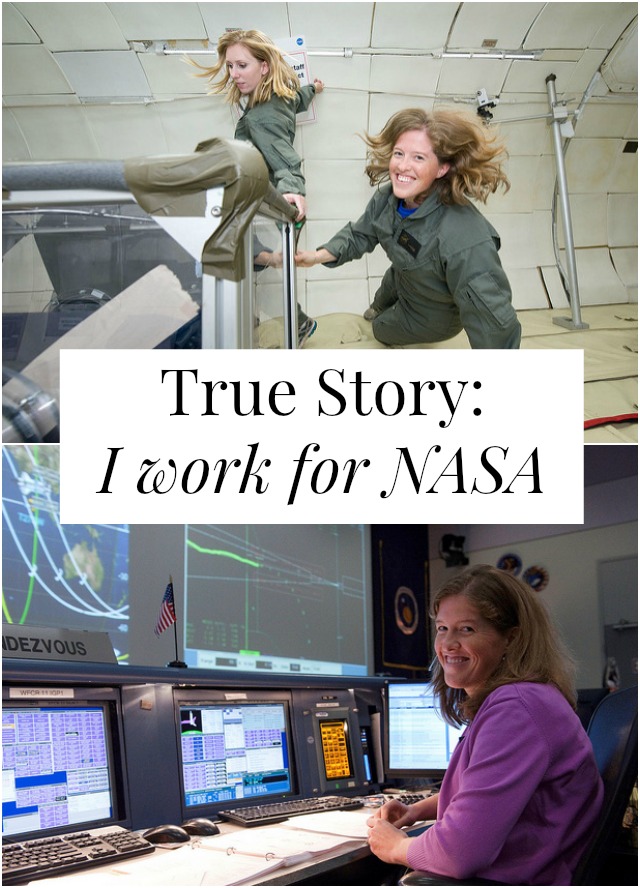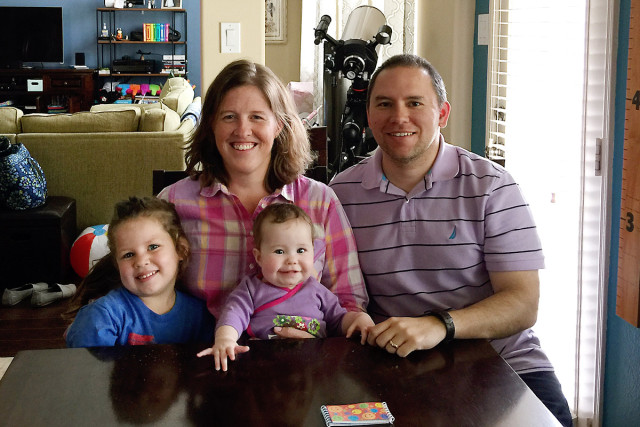
What’s it like to have a job at NASA? To work AT MOTHER LOVING MISSION CONTROL?!!! How do you not get one million ulcers? How often do people make ‘rocket scientist’ jokes at you? Today, Sarah Ruiz is telling us all about her 14-year career at NASA and the truth about weightlessness. Obviously, Sarah’s interview answers are her own and not some official statement from the National Aeronautics And Space Administration.
Tell us a bit about yourself!
I’m Sarah Ruiz and I just celebrated my 38th birthday. I’m originally from Charlotte, NC but now live in the suburbs of Houston, Texas with my husband and our 2 daughters. My kids are still little — 3.5 and 7 months — so when I’m not at work, I’m usually neck deep in child-wrangling. I’m also a quilter and a runner, and have been writing on my personal blog for 15+ years.
What’s your official job title?
According to the federal government, my job classification is “Aerospace Technology, Lead.” In actual language, I lead the Operations Safety Group for the International Space Station. NASA has several centers located around the country and I’m located at the Johnson Space Center in Houston.
In the past, I worked in Mission Control for the space shuttle. My specialty area as a flight controller was rendezvous, which is the process of getting the space shuttle from the ground to a specific target in orbit like the space station or the Hubble telescope. When the space shuttle was retired in 2011, I moved over to my current area.
When did you first become interested in space?
Absolutely — I was in 9th grade and was visiting the Kennedy Space Center in Florida as part of a student science competition that I’d entered. My dad worked as an engineer when I was young but didn’t stay in that field, and while I definitely picked up an appreciation and talent for science and math from him, I was more interested in other subjects and wanted to be a teacher or a Disney animator.
But on that trip to Florida after seeing the space shuttle and hearing from engineers there, it suddenly occurred to me that working at NASA was something people could do — and that it was something I could do too. From then on, I was hooked.
What sort of schooling does one have to go through to work for NASA?
I have a B.S. and M.S. in Aerospace Engineering. An engineering or science degree is pretty typical of a large chunk of the agency’s workforce since our business is space exploration and that requires a lot of technical expertise. But NASA takes all kinds of people — seriously.
One of the biggest misconceptions about the agency is that you have to be an engineer or scientist. We also have doctors, lawyers, public affairs specialists, writers, photographers, graphic designers, accountants, educators… You name it, and there’s probably someone at NASA who does it.

Sarah with her family on her birthday
Can you walk us through an average day at work?
It really depends on what your job is. An astronaut’s average day would be far more interesting than mine because they get to fly airplanes and play giant video games! (That’s mostly a joke — but sometimes their training sessions and simulations really do seem like a kind of game.)
My days are probably not that different from a lot of other people. I answer questions, deal with issues, wrestle with my inbox, make charts and give presentations, and go to a LOT of meetings. The difference lies in the specifics. A meeting could be a weekly staff update…or a major review to determine the agency’s readiness to launch the next group of astronauts. An unexpected issue could be helping a group member prioritize tasks…or it could be broken hardware on the space station that needs to be addressed immediately.
It seems (at least to me) that working for mission control would be increeeeedibly stressful – so much hangs in the balance! Do you find it to be stressful?
I worked in Mission Control from 2005-2011 and yes, it could be stressful because there’s little room for error. Each time the space shuttle flew there were human lives and billions of dollars at risk if we made a mistake. The space station operates a bit differently, but the same risks still exist and have to be managed on a daily basis.
The two biggest ways I (and every other flight controller) mitigate that stress are planning and training. Missions and experiments are heavily planned in advance — “spontaneous” is not a word you hear in the space program — and that planning always includes discussion of “what ifs” — what if this doesn’t work, what if that takes longer than will think it will, etc.
On top of that, becoming certified as a flight controller requires months or years of education and training that is tailored to the specific system you are responsible for. We work through many simulations to practice and hone our procedures and troubleshooting abilities. The process is very thorough and leaves everyone feeling confident in their ability to react appropriately to whatever challenge comes at them.
Have you ever gotten to experience zero gravity?
Yes! I’ve volunteered several times for one of NASA’s educational programs that invites students and teachers to perform experiments on a microgravity airplane flight. On these flights, the plane follows a specific path that provides 20-25 second periods of weightlessness.
Each of those is followed by a period where you experience twice the force of gravity. The back-and-forth between floating and being pressed to the floor can wreak havoc on your inner ear, and the plane is affectionately nicknamed the “Vomit Comet.”
Being weightless feels sort of like being in a swimming pool, but without any of the pressure or resistance of the water — it’s totally unique. There are a couple private companies that offer these flights to the general public from time to time. I think they start at ~$5,000.
In your opinion, what can we – as parents/aunts/uncles/interested grownups – do to help more girls get interested in science, math, and tech?
Quilting is a big hobby of mine, and when I read patterns and tutorials I often come across some variation of “warning — this part involves some math.” This drives me absolutely crazy. We’re talking about addition and subtraction, maybe some multiplication and division. This is elementary level math! Enough with the idea that numbers are scary!
Overall, I really think that the best thing we can do to get girls interested in STEM fields is start early, and make math and science accessible and fun. My 3.5 year old loves to count things — hey, that’s math! We read “The Very Hungry Caterpillar” and she sees that he turns into a butterfly — hey, that’s science!
So many people reach the premature conclusion that math and science are “hard” and dismiss the subjects without ever really giving them a chance. There is nothing intrinsically harder about math and science than there is about language or history. Like any other subject, you just have to spend some time and effort to understand it.
What have you learned from your work at NASA that any of us could apply to our daily lives?
I’ve learned thatThe International Space Station orbits the Earth 16 times each day and people have been living there 24/7 for more than 15 years. That space station represents the combined effort of more than a dozen countries and is a jaw-dropping wonder of the modern world.
On a personal level, I think this work has been a great reminder that whether our goals are small or big, when people decide to work together towards a positive outcome, we can do some truly amazing things.
Lastly, how often do people make “rocket scientist” jokes to you?
Heehee. To be honest, the joke that gets a lot more play in NASA circles is “we can put a man on the moon, but we can’t ______.” Fill in the blank with something like “change a lightbulb in the breakroom,” “get everyone connected on this telecon,” or any other seemingly simple task that somehow hasn’t been done!
Thanks so much for sharing your story, Sarah! Do you guys have any questions for her?
P.S. More interviews with people who have fascinating jobs, like a state senator, a shaman, and an archeologist!







Love this! And as a physicist who knits, I know exactly how you feel about “this involves some maths” warnings on things that are simple arithmetic… 😀
I too loved this! Math and science are fun, and more girls (and women) need to hear it.
Wow! I was a total space nerd (ahem, AM a total space nerd) starting when I watched Apollo 13 at the age of 13. But I never did get over the math part. And weirdly, I too wanted to be a Disney animator!!
So cool to have found your personal blog, Sarah! I’m a beginner quilter, so I’m sure there’s tons of overlap in our interests.
Another spacey quilter!!! Yaaaaay!
Love this! I’m an administrative assistant at Goddard Space Flight Center in Maryland. My group works with climate data from satellites. Sarah perfectly describes how awesome it is to work in a community with shared goals. Thanks!
Cool! Nice to “meet” another NASA person here!
this is so COOL! thanks, sarah(s)! this is one of my favorite true story interviews so far.
I have been part of mission control team for controlling satellites for orbit raising (i.e. what happens after SpaceX launch of a rocket with a satellite on it) and it is awesome.
Cool! My background is trajectory too, so I imagine our experiences have some similarities.
Hi! I really love your True Story Interviews series. I think it’s so refreshing and interesting to see just a little more about the real people behind the various jobs we only read/hear about. Love it! Thanks for keeping this series up!
Thanks so much! I love putting them together! 🙂
I love this story! My dream job is to work at NASA but for the life of me I can’t figure out how to make it happen. So cool to get a more tangible sense of what it could be like to work there!!